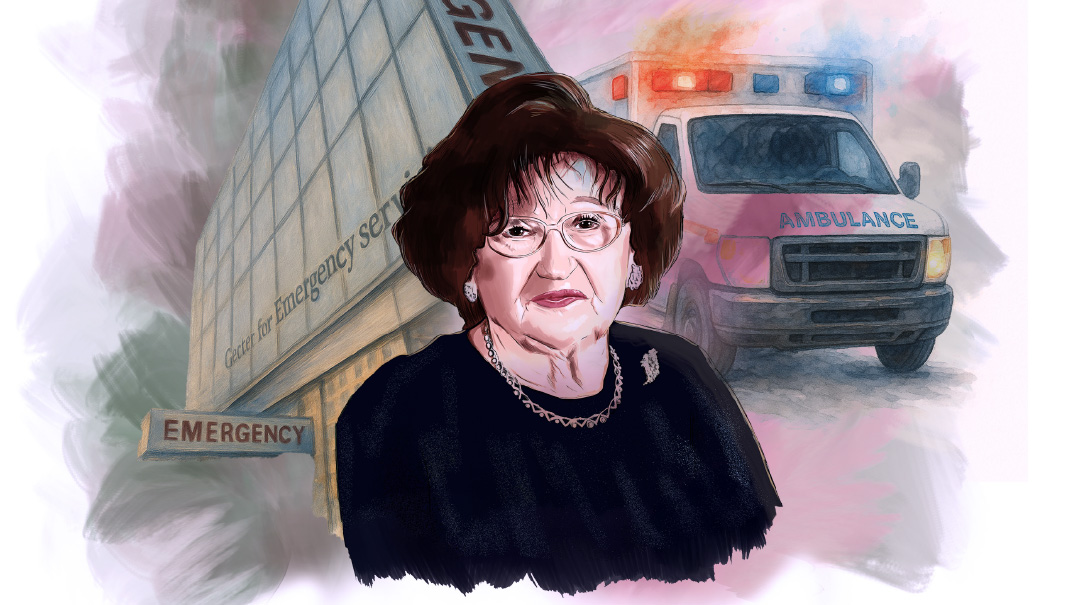Long-Term Division
| November 18, 2020When a child’s marriage dissolves, parents instinctively want to step in to help. How can parents be a bulwark of strength for their child when they themselves are reeling from pain? Mothers and experts share their hard-earned wisdom

Looking back, there were hints that something was amiss. Shifra regularly called her newlywed daughter, Chava, who was living across the Atlantic in Israel, and early on, Chava shared some worrying observations about her new husband. But Shifra didn’t dwell on it — after all, it was shanah rishonah and the young couple was starting out on unfamiliar terrain.
As time passed, Shifra figured that “no news was good news.” Still, she was a little disconcerted by the strained silence whenever she spoke to Chava’s siblings about their visits to their sister’s home. “I found out later that they knew what was going on, but Chava made them promise they wouldn’t tell me anything,” says Shifra.
Chava’s second child was due right after Pesach so the plan was that she’d return home before Pesach, stay through the birth and initial recovery, and then return to Israel. But after the baby was born and Chava was safely ensconced in her parents’ home, she decided she wasn’t flying back.
“By then, we’d seen the marriage up close and finally understood how troubled the relationship was,” says Shifra.
Even though Chava didn’t want to return to Israel, she wasn’t ready to end the marriage yet, which left Shifra walking a fine line. “On the one hand, you want to be supportive,” she recalls. “But on the other hand, if it will blow over, you don’t want to say something that will linger.”
Chava ultimately divorced, thrusting Shifra and her husband into roles they never imagined.
Shocks Waves of Pain
According to the Homes and Rahe Stress Scale, divorce is one of the most stressful life events. While the divorcing couple feels the brunt of the stress, other family members — especially the parents of the child — are also subject to intense emotional shock waves.
“There’s nothing more painful for a mother than a child’s suffering,” says Bracha, whose daughter left an abusive marriage. “I had nightmares for months after my daughter’s divorce, reliving in my mind what she had described of her experience.”
Feelings of guilt are common, as well as second-guessing, especially in circles where people marry younger, and parents have more input in shidduchim. “Some parents have a ton of guilt,” says Suri, a LCSW, who counsels women in difficult marriages. “They think, we did this, we pushed her into this shidduch. She told me she didn’t like him, he’s too quiet, and look, he ended up having Asperger’s.”
Embarrassment is another excruciating emotion to contend with. “Divorce is humiliating for a parent,” says Dr. Yael Respler, a psychotherapist in private practice who counsels couples. Parents can blush crimson just imagining the reaction from the outside world: What will people think? What will they say?
If the couple married recently, the shock might take the parent off guard: I thought everything was great or I can’t believe I just spent so much money on the wedding.
Sometimes parents struggle to understand why the adult child wants to divorce; they can’t understand the reasoning. “Parents have a hard time watching their children live out the negative consequences of their decisions,” says Rochel Goldbaum, an international speaker, teacher, dating coach, and relationships mentor. “But if we want to help them, we have to move past it.”
Although it’s a herculean task to find strength and maintain perspective in the aftermath of a shattered marriage, parents are in a position where they can’t afford not to. “You have to rise to the occasion because your child needs you to be there for them,” says Dr. Respler.
When parents get too wrapped up in their own emotions, it strains the parent-child relationship at a time when the grown child needs it the most. As Mrs. Goldbaum stresses, “if a child is struggling, moving into the pit with them won’t help.”
She likens it to someone at an airport who assists an elderly woman by removing her luggage from the baggage carousel. “You’d help her lift the bag, but you’d never dream of taking it home with you,” she says.
So, too, with emotional baggage. You can listen to your child and hold their problem for a moment, you can even cry with them. But after, you must hand their baggage back to them. “You can’t take it home with you,” says Mrs. Goldbaum. “If you own their problem, it’ll weigh you down. And what your child really needs is for you to be emotionally available.”
Though a parent shouldn’t carry her child’s baggage, she does need to deal with her own.
If she’s feeling guilt, for instance, she has to work her way through it. “Guilt paralyzes parents and prevents them from providing the divorced child with the emotional support they so badly need,” says Mrs. Goldbaum. “The goal is to learn from the past, and deal with the information you have now. That’s the best way to move forward.”
Seeking emotional support — through therapy, support groups, or close friendships — can help a parent gain strength and perspective as she shifts from coping to healing.
That’s part of what helped Shifra. “Processing the feelings that came along with the divorce wasn’t easy,” she says. “Everyone who gets divorced needs therapy. My husband and I talked through our feelings, we davened, we went for therapy.
“Our rosh yeshivah gave us practical guidance and chizuk. When I told him that I felt like we should’ve realized there was a problem before the wedding, he said, ‘Don’t be ridiculous.’ He helped me release unwarranted guilt.”
Bracha credits the innate positivity she inherited from her father in helping her. “He had great emunah even though he didn’t have an easy life,” she recalls. “He taught me to be present-minded. I remember thinking, let’s just move forward; let’s not rehash.”
A Delicate Dance
When a child’s marriage is on the rocks, how should the parents proceed? Should they step in to help — or step back? When and how much should they get involved?
It’s generally accepted wisdom that parents shouldn’t meddle in their children’s married lives, lest it create discord between the young couple. But Dr. Respler and Suri advocate for early intervention if there’s a real problem — “the earlier, the better,” says Suri.
“Every situation is different,” Dr. Respler says, “but there are some difficult marriages that can be saved. Even when it isn’t great, if it isn’t a crazy situation, try to make it work. It’s still a more stable family structure than a divorce.”
A divorce rarely happens suddenly, and when a marriage is floundering, parents often notice first. “If you see your child struggling, and there are additional pressures, try to help,” says Dr. Respler. “See if you can help with finances, offer babysitting, or send over supper.”
Bracha agrees. “It’s a mother’s place to be a mother,” she says. “Just because a child is out of the house doesn’t stop you from being a parent. You still have that responsibility.”
Many young couples are cautioned not to seek their parents counsel regarding any sort of marital conflict, they’re warned it can have the unintentional consequence of souring the relationship between parents and the spouse of their child. However, there are those who disregard the advice, and take their parents into their confidence if they deem their problem too big to bear alone.
“Girls’ parents are often quicker to get involved, maybe because a girl is quicker to share with parents,” says Suri. “Boys tell their rebbi, or a brother. Or maybe we’re more protective of our girls, and parents are quicker to intervene for a daughter than a son.”
She raises another point: “Because culturally we marry younger, many young couples don’t realize when their experience isn’t normal. Kids are drilled, don’t tell your parents, talk to your kallah teacher, but many kallah teachers aren’t trained for this. A couple in crisis needs to go to a rav, a therapist, and they need their parents to help them.”
On the flip side, there are situations where overly involved parents may be the impetus to their children’s divorce. “I’ve seen parents shlep their child out of a marriage,” says Dr. Respler. “They encourage their children to divorce and say things like, come home. You don’t need this. You may not like your child’s spouse, but that’s no reason for them to divorce.”
Suri makes a similar observation. “Parents have the instinct to save their children. It can be hard for a parent to understand, and they’ll ask their child, why are you staying? Why can’t you just leave?”
While there are parents who plant seeds of discord based on a personal dislike of their child’s spouse, it isn’t always coming from a bad place. Parents want to protect their children; they want them to have a happy life.
But the instinct to save doesn’t always give parents the presence of mind to admit that all relationships are nuanced, even their children’s, and where they see overwhelming imperfection, there may simply be normal marital issues that could be addressed with the help of a skilled marriage counselor.
Making the Decision
Reva got divorced ten years ago, but she still clearly remembers the wise way her parents responded to her predicament. “They said to me, ‘You have to decide whether or not you want to stay married. But we’ll support you either way.” Reva’s father was also up front about his own bias: “He said he cannot be objective when he sees me in pain, and he wants the marriage to be over, but he understands that I may decide to remain in the marriage for the sake of my children.”
Not only should parents leave the decision of divorcing to their child, but if the divorcing couple has children, it’s best to remain uninvolved in the entire process — including conversations with lawyers, settlements, custody, and other arrangements.
“In a relatively normal situation, the less involved, the better,” says Dr. Respler. “Be emotionally and financially supportive, validate your child, but don’t get involved in the process. It can get sticky.”
Dr. Respler cautions there is a caveat: “A parent may need to get involved if the adult child is relatively young, or in a situation where there is physical and emotional abuse, or an addict,” she asserts. “People involved in an abuse situation may think, maybe there’s something wrong with me and I deserve this. Parents can’t take a passive role then; they must take more of a stand.”
Bracha only discovered that her daughter, Avigayil, was in an abusive marriage when concerned neighbors reached out to her. “We brought Avigayil back to our home to ensure her safety, and had her live with us while she was getting therapy from a psychologist who specialized in abusive relationships. We proceeded cautiously the whole time, getting advice from experienced rabbanim, as well as professionals in the field of domestic abuse,” says Bracha.
She also financially assisted her daughter. “We did what we had to. I didn’t want any impediments getting in the way of what my child needed.”
Yet even with all her involvement, Bracha didn’t dictate. “I was very clear on what I thought was best, but this was her life. However, if Avigayil had decided to try to work on the marriage, we would’ve made sure the couple received therapy before moving back into their home, and we would have monitored the situation closely.” It took some time, but ultimately, Avigayil decided to divorce.
A Wall of Support
By the time a couple reaches the technical stage of divorce, their emotional support has often shut down. “Their friends have had enough, and many times their family has had enough,” says Rachel, a divorce lawyer practicing in New York. “They’re embarrassed, and often their self-confidence has taken a hit.”
This is when they need their parents the most, and there are myriad ways to show support.
“Be a wall,” says Mrs. Goldbaum. “A wall is solid, strong, supportive, and consistent. A wall doesn’t lean in, give advice, ask a lot of questions, get hysterical; it doesn’t control. The best way for parents to be supportive is to ask: ‘How can I best support you?’
“For some, it will mean accompanying their child to a lawyer, to’en, or picking up the get. For some, it means having a child move back home to a space where they can feel independent. Maybe it means being a listening ear without getting sucked in.”
Suri admits that parents have a big job: “They need to provide physical, emotional, technical, and financial support,” she says. “The people I see would be up a creek if not for their parents’ support.”
If the divorcing couple has children, the support of a grandparent can be instrumental. “Grandparents can supervise during visitations, pick up groceries or make meals, take over car pool when needed, and be there for the grandchild after school,” says Rachel. “When there’s grandparent support, the grandkids are much better off.”
For Shifra, being supportive meant opening her home to Chava and the grandchildren. “The ones who have good support are the ones who make it, so we opened our door,” says Shifra. “Our home was a buffer, a safe place to fall. For parents, there’s no other choice. You need to be there to listen, to help out with what you can, to give your child a place to be.”
Bracha’s daughter also moved back home temporarily. “Moving back home is not the solution to a divorce’s problems. It’s a transitional time between a hard place and an emptiness, which will hopefully be filled one day,” she says.
She recalls a time shortly after Avigayil moved back home, when she heard sobbing from behind her daughter’s closed door. “Avigayil doesn’t share emotions,” says Bracha. “She didn’t mean for us to hear. I knew she was crushed that her marriage had failed, and was mourning the death of a dream.
“I knocked and asked if it was okay to come in. My husband and I held her, with no words, just holding her for a long time. It gave her the chance to cry out the pain, but with support and caring all around her. She didn’t need to explain, just to feel understood and cared for.”
The Next Generation
“There is a huge difference between divorce with children and no children,” says Dr. Respler. “With children there’s an attachment to the ex-spouse for life, unless one parent absconds. For the sake of the grandchild, it behooves parents to encourage a respectful relationship.”
She cites the famous study conducted by Wallerstein and Kelley, which studied the long-term effects of parental divorce. “If there’s a peaceful divorce, or even amicable, the kids have a good chance of turning out okay.”
Suri advises parents to keep their relationship with their ex-mechutanim as peaceful as possible. “You’ll share these grandchildren forever. Yes, they may hate you, but put up a front, and be decent, be civil,” she says.
This is a rule Shifra lives by. “You can’t let your emotions get the best of you,” she says. “Don’t make disparaging comments to the kids about the other side. We had friends who divorced, and saw what they went through. We didn’t want our grandchildren to have to endure that. Kids need two parents.”
Since the divorce, there have been shared family simchahs. “It wasn’t great in the beginning,” Shifra admits. But as time went on, things improved, perhaps underscoring the importance of maintaining a good relationship even if it seems one sided.
When the family came together again recently for her grandson’s bar mitzvah, her ex-mechutanim came to shul and they stayed in a neighbor’s home for Shabbos. Chava’s ex-husband also spoke at the seudas mitzvah. “At the hanachas tefillin, my former mechuteneste thanked me for giving my grandson a warm home,” Shifra shares.
Some families have to deal with ex-families who make disparaging remarks about them, even going so far as to slander and mudsling. “It’s really hard when other people say negative things about you,” says Mrs. Goldbaum. “I ask people, who would you rather be? You or the person talking about you? They always choose themselves, and that gives them confidence. Besides, a person will never lose out from doing the right thing.
“It also helps to remember that although people talk, they don’t really know,” she continues. “There is a saying: What other people think of me is none of my business. We have no control over what other people think, and it doesn’t create reality.”
This mindset is what helped Bracha. “When the other side called us liars, and even hired a lawyer who acted as if we had fabricated the story, I told myself, if I had to choose, I would rather be the parent of the abused than of the abuser. Of course they’re in denial. This is too hard to face.”
Rivka’s son, Tzvi, was in a marriage that was problematic from the start. It was additionally complicated when he learned he had bipolar disorder. After the couple divorced, her ex-daughter-in-law’s family blamed her, both for his disorder, as well as for all the other problems in their marriage.
“I know we were up front with them from the start. If they closed their eyes to the problems, I cannot take responsibility for that. But, I can relate to their distress with compassion, rather than relate to their unfair criticism with a sharp retort,” says Rivka.
“What helped me out was sitting down and writing out a lengthy response — getting it off my chest and onto the computer, where it remained for a while, giving me satisfaction while doing no damage.”
Moving Back Home
When a grown child moves back into his childhood home, it’s an adjustment for everyone. The only way to successfully navigate the hurdles is through communication.
“Sit down and discuss what’s expected before a divorced child moves back in,” advises Dr. Respler. “Discuss privacy, set boundaries. If a child is working, will they contribute to household expenses?
“If there are grandchildren involved, discuss their financial arrangements. Hopefully, the ex-spouse will contribute. Sometimes, it doesn’t pay for a divorced mom to work, because childcare costs are more than her salary. Talk things through in a loving, respectful tone. Remember, you have an adult, not a child, moving back in.”
Suri remembers a case where a 25-year-old with kids moved back home and the divorcée’s younger married siblings were treated with more respect than she was. “It was really a terrible situation,” Suri says. “Don’t turn your adult child back into a five-year-old. Don’t tell them what they can or can’t wear. Give them independence.”
When Shifra’s daughter divorced, she moved back in with her parents for practical reasons — she was working nights, and needed help with childcare. They ended up dividing household responsibilities; since her daughter Chava is a wonderful cook, she took over most of the kitchen duties.
“Initially, Chava was hesitant to move in because she wanted to be the final authority over her children, and she wasn’t sure how that would play out if she lived with us,” Shifra remembers. “So we talked about it — we’re big on talking everything out.” Over time, they worked out a discipline plan. “We would ask Chava, can you please tell the children… and the final word came from her.”
When Tzvi and his kids moved back home, discipline was discussed in advance. “We agreed it was his responsibility,” Rivka says. “But we did exercise Bubby and Zeidy power when it came to what’s proper in our home. So if they broke a house rule, we said something.”
In some ways, Avigayil’s return home was seamless. “It was as if she had never been gone,” says Bracha. “Pitching in was never an issue. That’s just the type of person she is.”
But there were other challenges. The relationship between Avigayil and her sister Chedva, who is just a year younger, had always been strained, and Avigayil’s divorce created additional tension.
“It was rough between them,” Bracha recalls. “When Avigayil moved back, we tried to make it easier for Chedva. They used to share a room, but we gave Avigayil a different room when she returned. Avigayil has a business she runs from home, and clients would come and go, but Chedva didn’t want that in the house, so Avigayil rented space elsewhere.”
When the dust settles after a divorce, it’s tempting to look backward. “But it isn’t helpful,” Shifra says. “Don’t second-guess yourself. You can tell yourself a million times, I should’ve realized. I should’ve said something during their engagement. Sometimes you have to realize there is no resolution. This is what Hashem gave us, and we have to deal with it from here.”
Bracha agrees. “There is no point in going backward. The past is gone. Be there for the pain and confusion your child is going through now. And move forward.”
What to Say — and Not Say — Post Divorce
“When people hear about a divorce, they have a fight-or-flight instinct,” says Mrs. Goldbaum. “They either want to run to the rescue, or run to the next aisle at the grocery.”
The rescue types might offer advice or ask questions because they want to fix things. But there’s little to do to reverse the circumstances, and offering advice serves no useful function.
“You have to realize that by the time you hear about the divorce or separation of your friend’s child, they did all the intervention; they tried everything already,” says Tammy, whose son recently divorced. “People think they’re going to offer advice that will fix things. They think that the parents probably didn’t know what to do.
“They don’t realize they’re seeing the middle of an ongoing story, often a nightmarish story, and whatever you’ll suggest, they went that route already, and it didn’t work. Realize you’re stepping into painful territory, and treat the people and situation accordingly.”
When Chava moved back home, a neighbor who knew nothing of the situation told her, “Think twice before divorcing; it’s not as easy the second time.” Chava had not made her decision lightly, and the advice was both unhelpful and hurtful.
Reva recalls people asking both her and her parents all sorts of invasive questions. “They’d ask, did you go to the right therapist? Or, how many years was it bad for? They’d even say things like, the kids will never be okay,” says Reva.
The people who run to the next grocery aisle might also be coming from a good place — they don’t want to be a bother or cause an awkward interaction. But while staying away might feel safer, it leaves the divorced person and their family feeling even worse.
“Some people reacted as if they didn’t feel,” Reva remembers. “They said oy, and then went on their way. Maybe it sounds cliché, but whoever called and just said simply, we can’t imagine how hard this must be, but we are here for you in any way, and did this without asking for details — that was the most sincere, classy, and heartfelt.”
Tammy stresses the importance of listening. “Be supportive, nonjudgmental, empathic, and sensitive without pitying,” she says. Be curious about how your friend is doing, not about the story surrounding the divorce.
And avoid reassurances, and saying things like, “I’m sure everything will turn out fine” or “at least he gave a get easily.” Responses like these brush aside pain, and make people feel as if their feelings aren’t being heard.
It’s hard to know exactly what to say, but keeping it simple and sincere can go a long way in letting your friend know she has your emotional support. “You can say, I love you, I’m here for you,” says Mrs. Goldbaum.
Here are some additional pointers:
Common Responses That Cause Pain
-Dodging: Changing the topic, checking your phone, finding reason to end conversation.
-Silver Lining: Finding ways to look at the bright side, the positive aspects.
-Minimizing: Looking for ways to make the problem seem smaller.
-Advising: Trying to solve the problem.
-Storytelling: Trying to relate by telling a story that seems similar.
-One-Upping: Telling about someone in a worse situation.
-Drama: Overreacting, crying; causing your friend to need to comfort you.
Ways to Signal Empathy
-Listen: No judgments, no answers.
-Connect with your friend’s feelings: Even if you haven’t experienced the same thing, think about your own struggles. Use your imagination to try and truly understand how your friend feels.
-Acknowledge the pain: You can’t make the pain go away with anything you say, but let them know you see their struggle, and that you’re there for them.
-Show you care: This is different for each person. Sometimes it helps to think about what worked for you when you were in a painful place, and start from there. Sometimes that means just sitting with the person; sometimes it means writing a note. Some people comfort with food, flowers, or small gifts.
(Originally featured in Family First, Issue 718)
Oops! We could not locate your form.













